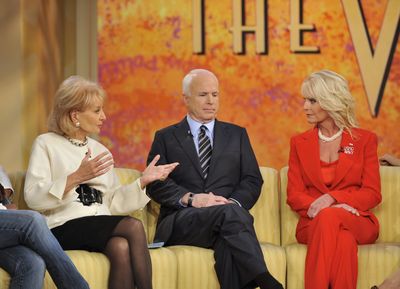McCain errs in comment on Palin earmarks
Candidate said running mate made no requests

NEW YORK – John McCain got it wrong Friday when he asserted that his running mate, Alaska Gov. Sarah Palin, had not requested any earmarks, the spending directives lawmakers insert in spending bills that McCain has vowed to eliminate.
Palin, in fact, requested $198 million in federal earmarks in February, including such expenses as $487,000 to fight obesity in Alaska and $4 million to develop recreational trails.
Alaskans receive almost twice as much per capita in earmark spending – $506 – as the second highest state, Hawaii.
By day’s end, the McCain campaign backed down from the claim the Republican presidential candidate made on the ABC television show “The View.”
“Sen. McCain was in the throes of a discussion about her record of reforming government, which includes drastic cuts in wasteful spending in the Alaska state budget,” said McCain spokesman Tucker Bounds. “If he gave viewers a mistaken impression, it certainly wasn’t intentional or without some basis in fact.”
Palin’s approach to earmarks has been much closer to the views of Barack Obama, the Democratic presidential candidate, than McCain, who wants to end the entire earmark system.
On Friday, in an interview with ABC News anchor Charles Gibson, Palin was asked whether she was in agreement with McCain that earmarks should be eliminated.
“I certainly am,” she said.
But later in the same interview, she appeared to indicate she hoped to reform the process, not end it, saying she wanted it “to be in the light of day, not behind closed doors, with lobbyists making deals with Congress to stick things in there under the public radar.”
“That’s the abuse that we’re going to stop,” she said.
As recently as last month, Palin indicated her support for earmarks in a column in the Fairbanks News-Miner, calling her earmark request “a responsible approach.”
Alaska has consistently been the largest per capita beneficiary of federal earmarks, in part because the state’s congressional delegation is enormously powerful and provides well for a small population in a state with a large federal presence.
Palin has requested earmarks from the congressional delegation for years, and the delegation has delivered. As mayor of the small town of Wasilla, she hired a lobbyist to help secure earmarks for transportation and other projects. As governor she also requested earmarks, though her requests have declined as she acknowledged growing public disapproval of the practice.
On “The View,” McCain said that Palin would help him reform Washington, in part by putting a stop to the funding of lawmakers’ pet projects through earmarks. When co-host Barbara Walters pointed out that Palin requested earmarks of her own, McCain interjected: “No, not as governor she didn’t.”
For years, McCain has railed against the practice of lawmakers slipping in requests to fund pet projects without the standard oversight and review.
Every year, he stands on the Senate floor and reads aloud the list of earmarked spending instructions lawmakers have quietly inserted into defense appropriations bills requiring the Pentagon to buy unwanted or unneeded services and equipment.
In recent years, his lists of “objectionable” spending included almost $2 million in earmarks that Palin requested when she was mayor of Wasilla.
McCain’s persevering objections and a series of scandals involving Appropriations Committee members led to some reforms, including more transparency, which Obama supported in the Senate and which Palin has since hailed. The reforms were spurred in part by McCain’s repeatedly calling attention to what he termed “the bridge to nowhere,” a span designed to connect Ketchikan, Alaska, with the city’s airport on a nearby island. The bridge became the best-known example of “earmark abuse,” though many in Alaska still thought the project was a good idea.
When she ran for governor, Palin backed building the bridge. But after she became governor and the specific allocation had been withdrawn following McCain’s complaints, she said the bridge would no longer be built, although she kept the funds.
Since then, Palin has cut back her requests for earmarks, submitting $198 million in requests for 2009 fiscal year compared with $256 million for the previous year, her first as governor. Her position was best summed up during a news conference she held earlier this summer with Sen. Ted Stevens, R-Alaska, when she said that political realities require Alaskans to think differently about earmarks.
“Both presidential candidates have both confirmed that they will work towards earmark reforms,” she said. “So, just recognizing that, seeing the writing on the wall, and dealing with it is where I am.”